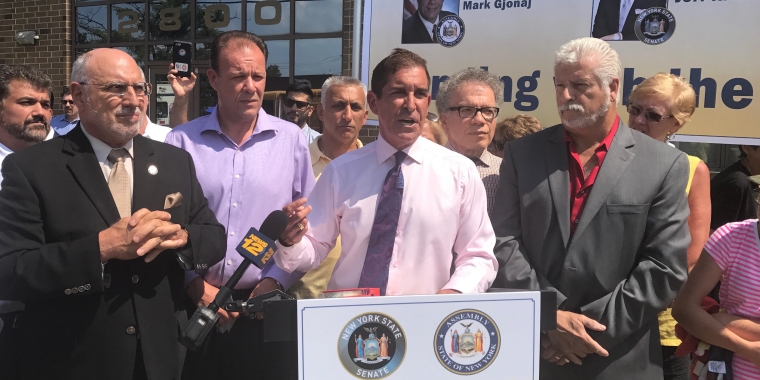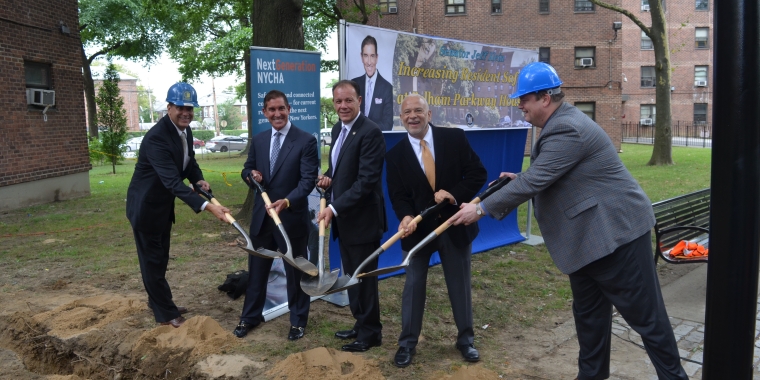
Office of Mental Retardation Third Largest Overtime Spender in NYS
Jeffrey D. Klein
June 9, 2010
Led by Senator Klein, Task Force on Government Efficiency Unveils Millions in Potential Savings
ALBANY, NY – The Senate’s Task Force on Government Efficiency, chaired by State Senator and Deputy Majority Leader Jeff Klein, released an investigative report citing millions of dollars in wasteful spending on overtime, housing, and poor cost containment by the NYS Office of Mental Retardation and Developmental Disabilities (OMRDD) at a press conference in Albany on Wednesday. The report is the fourth in a series of investigations into state agency spending by the Task Force. The Task Force also announced on Wednesday that it will hold a hearing to probe OMRDD on its wasteful spending practices later this month.
“It's time to get serious about short-term fiscal solutions while also keeping a keen eye on fixing the long-term problems plaguing our state agencies. Massive, unregulated overtime is plaguing our state coffers and will continue to bleed our state dry if we don't get it under control. There is no reason why government can’t spend less and still provide quality services – we can and we must get smart about our spending,” said State Senator and Deputy Majority Leader Jeffrey D. Klein (D-Bronx/Westchester).
The Task Force’s report revealed that OMRDD ranked third in overtime across all state agencies in Fiscal Year 2009-2010 - at nearly $70 million - coming in just behind the Department of Correctional Services (DOCS) and the Office of Mental Health (OMH). Much of that overtime was concentrated among a small number of workers in a few positions. For example, six of the top twenty overtime earners at OMRDD - and the top three overtime earners overall - were development aides and assistants at the Long Island Development Center. The top three individuals earned more than $200,000 combined in overtime last year alone, on top of their annual salaries, which ranged between about $40,000-$60,000 per year.
“Just like families and businesses across New York, state government must continually ask whether or not the financial resources available are being used efficiently. High overtime costs and questionable real estate expenses certainly raise legitimate concerns. I want to know that, in this time of crisis, the best possible decisions are being made to ensure that funding is directly benefitting the mental health and developmentally disabled consumers,” said Senator Betty Little (R-Queensbury).
Additionally, when the Task Force compared the staff costs at OMRDD operated facilities in the Bronx and Westchester with those of a voluntary organization’s facilities in the same counties, it found that the OMRDD facilities have a higher cost per employee than the homes operated by a not-for-profit organization. This raises questions as to whether the OMRDD facilities deal with more difficult situations as compared to nonprofit-run facilities, and whether the nonprofit facilities have less overtime because of higher staff-to-client ratios.
The report also uncovered a shockingly wasteful history at OMRDD with regard to purchasing properties for use as group homes. In 2008, in the town of Yorktown in Westchester, OMRDD approved the purchase of two houses for use as group homes by a voluntary organization. The voluntary organization paid $845,000 for one of these properties – a house with a pool and a hot tub that was appraised for $5,000 less than the selling price, and whose final sale price was 63% higher than the average sale price during the same period. Upon completion of necessary environmental modifications to this and a second home, the cost of these two houses to care for just thirteen clients came to $2.3 million. These monies spent by the voluntary organization ultimately fall on OMRDD for reimbursement, at a final cost to the state of $1.92 million.
The Task Force has already released reports and held hearings investigating spending practices at the State University System of New York (SUNY), the NYS Department of Correctional Services, and the NYS Department of Transportation.
The Senate Task Force on Government Efficiency was formed with the goal of uncovering inefficient government spending and developing productive solutions to put taxpayer dollars to better use. Chaired by State Senator and Deputy Majority Leader Jeff Klein, this bipartisan Task Force was formally announced in March of 2010. It is comprised of Senators Darrel Aubertine, Brian X. Foley, Craig Johnson, Betty Little, George Maziarz, Tom Morahan, Jose Peralta, Diane Savino, Jose Serrano, Bill Stachowski, Andrea Stewart-Cousins, and David Valesky.
Share this Article or Press Release
Newsroom
Go to Newsroom
